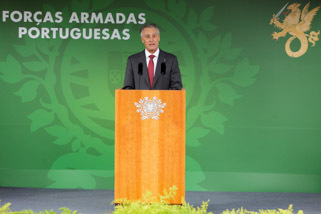

The President of the Republic addressed Parliament a message concerning the enactment of the legislation which alters the Juridical Regime of Divorce.
Following is the text of the President of the Republic’s message:
"Having enacted, to be published as law, Parliamentary Decree no. 245/X, which alters the juridical regime of divorce, I decided to address Parliament, in the use of the right provided under item d) of article nº 133 of the Constitution, the following message::
1. Decree no. 245/X was approved by a large majority following the return to Parliament, without enactment, of Decree no. 232/X, which approved the alteration of the juridical regime of divorce. As I then had the opportunity to state in a message equally sent to Parliament, the doubts raised regarding the options taken by the approved regime were many and deep seated.
2. Such doubts were not based on any ideological concept concerning marriage, but solely on the need to protect the frailer party in the matrimonial and post matrimonial context, in accordance with a realistic analysis of family and conjugal life in our Country.
3. The Decree which I have now decided to enact was somewhat changed in relation to the version originally submitted for enactment. However, such changes intensified in some instances the difficulties in interpretation of an already complex text.
4. In effect, the text of no. 2 of article no. 1676 maintains the «accountant’s» view of marriage, increasing, on the other hand, doubts as to the interpretation of the precept, since it recurs to vague and indeterminate juridically remiss concepts, the materialization of which will thwart the activities of juridical officers, particularly those of magistrates, at the moment when the law is applied.
5. It is true that the new text, contrary to the original version, limits the application of the law to those cases where there has been excessive negation to fulfilling the self interests of one of the spouses in favour of life in common.
6. What is not entirely clear, however, is the «excessive» denial of fulfilling self interests. Moreover, there seems to be little connection with the communion of life inherent to marriage that the self interest of the spouses is contradictory to the common interests of the couple, and that their renouncing them could give rise to a credit right. In effect, since marriage is a contract freely entered into by adults, in the voluntary exercise of their private autonomy, and the same implying the compliance with a number of personal duties, accepting such a commitment will always involve renouncing personal interests.
7. The assessment of «relevant personal losses» will always be a questionable procedure, and, yet more grievously, their reimbursement, since this will oblige one of the former spouses to pay necessarily large amounts («patrimonial relevant losses»), which will bring about post matrimonial conflict. More than this, such a payment could occur to the benefit of one of the spouses that systematically infringed conjugal duties – fidelity, respect or others – and who decides unilaterally to put a term to life in common. The resulting litigation tends to project itself to third parties, specifically upon the couple’s under age offspring, and this still appears more questionable when, at the same time, the rules regarding the exercise of parental responsibilities have been changed.
8 – The deep unfairness of the legislation emerges equally when the wedding is held under the regime of common property, from which may result that the spouse who did not cause the divorce could be heavily prejudiced due the enforced application, in the sharing of property, of the regime of joint ownership of assets acquired during wedlock.
9. The changes now approved do not remove doubts as to multiple other aspects of the new regime, particularly the lack of protection of the wife and under age offspring, as I had the occasion to point out in the message I addressed to Parliament and which was welcomed by many segments of our society.
10. As such, particular emphasis should be placed on the understanding shown by juridical officers, by specialists in Family Law and other individualities or bodies, such as the Portuguese Association of Women Jurists, whose opinion on this issue should not be ignored.
11. It is worth while to recall the statement sent to several parliamentary groups by the Portuguese Association of Women Jurists, that the new juridical regime of divorce «is based upon a fictional social reality» of «a society with a de facto equality between men and women» and is not preventive of «the rights of women victims of domestic violence». The same Association adds that «The experience of other countries where regimes similar to that contained in the legislation under appreciation were put into practice was revealed to be negative by a large number of the female population».
12. Added to such difficulties is the expectation of growing legal disputes surrounding divorce, now referred to a subsequent moment and to a distinct legal forum, with the inherent personal and financial supplement to which both former spouses will be subject, especially those in a frailer situation.
13. Such an increase in legal disputes will have tragic effects, not just on the operation of the courts but, more grievously, on family stability in the matrimonial and post matrimonial contexts and inclusively on the outcome of the divorce proceedings.
14. Added to all this will be the legal disputes concerning the legislation applicable to the regime of assets at the time of partition, specifically for those who married with community of property, now ineluctably subject to the regime of joint ownership of property acquired during wedlock and, also, the exercise of parental rights.
Notwithstanding the new regime having been accepted by a large majority I believe it my duty, due to imperatives of conscience and institutional loyalty, to provide Parliament with my deep conviction as to the need to adopt new devices to accompany the application of the new juridical regime of divorce.
Lisbon, 21 October 2008".
© 2006-2016 Presidency of the Portuguese Republic
You have gained access to the records of the Official Site of the Presidency of the Republic from 9 March 2006 to 9 March 2016.
The contents available here were entered in the site during the 10 year period covering the two mandates of President of the Republic Aníbal Cavaco Silva.